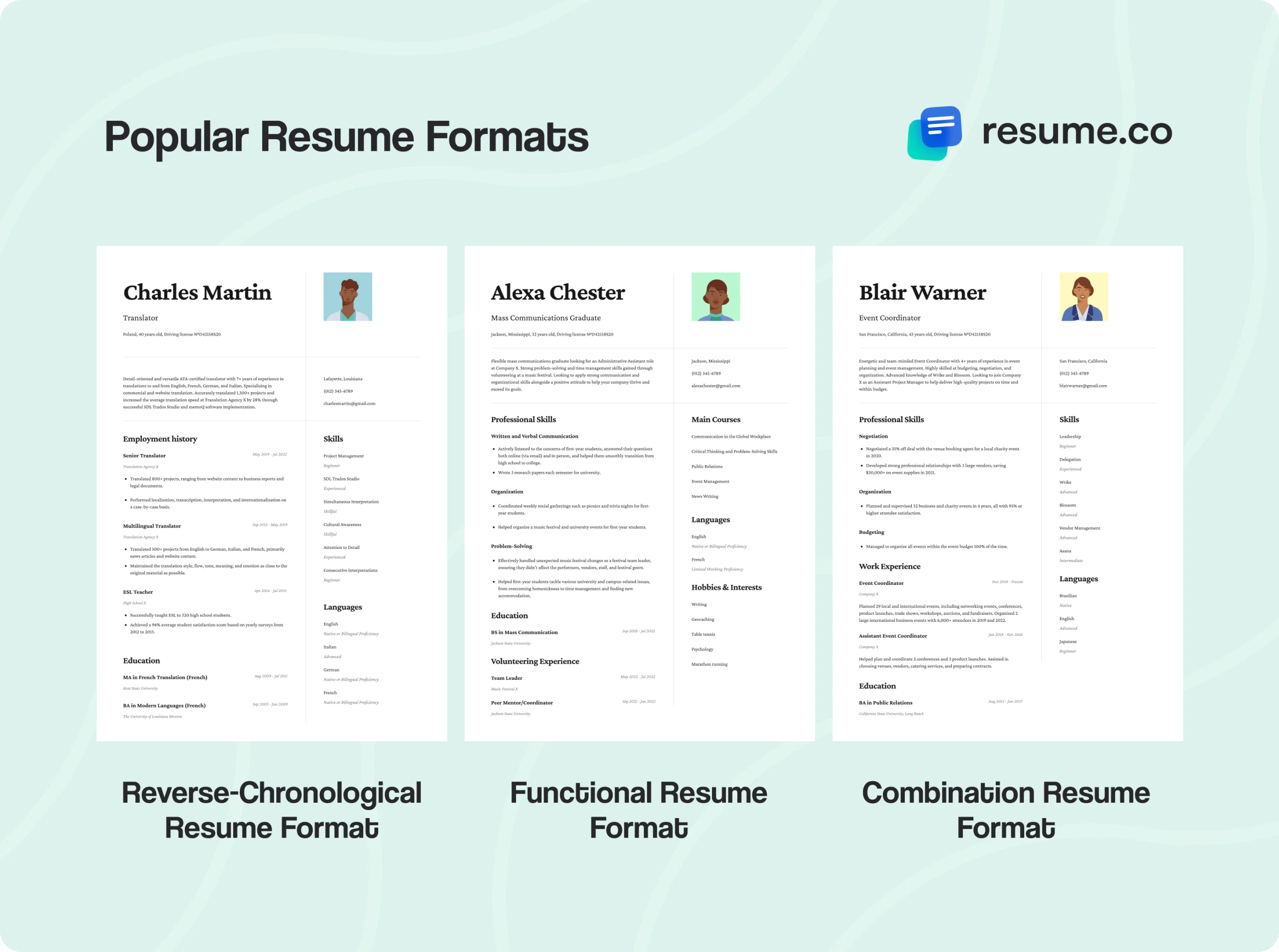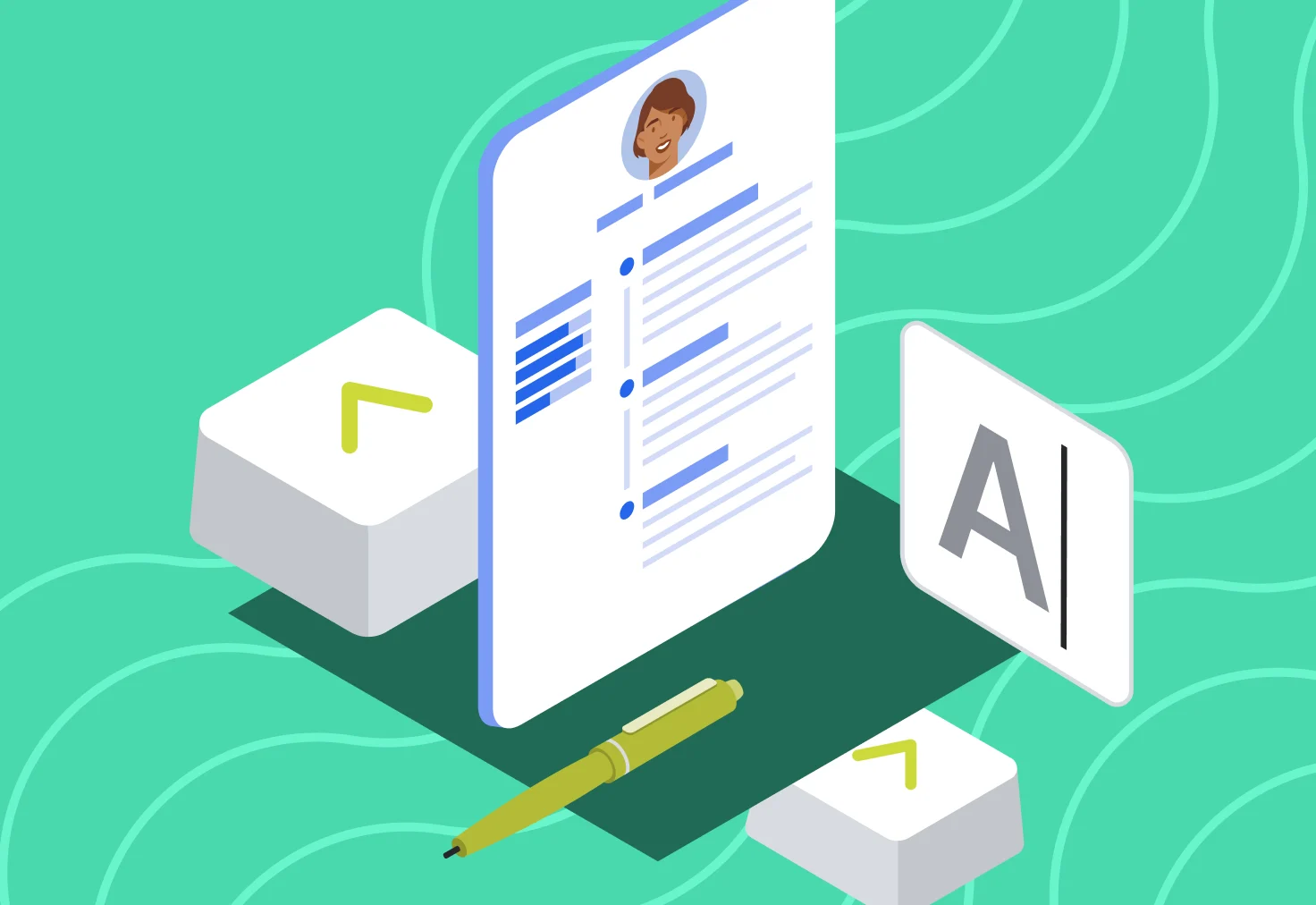Accounting is an extensive field with different opportunities and hundreds—or even thousands—of professionals looking forward to landing a job within the industry. So, how do you stand out among the competition as a candidate? The answer is simple—by crafting a job-winning accountant resume.
If you’ve never created one before, you might be wondering what information to include, how specific you need to be, how to organize all of it on the document, and so on.
We’ve included all of that and much more in this thorough guide that will teach you how to create a professional accountant resume from scratch. Let’s dive in!
Key Takeaways
The chronological resume format is the best one for your accountant resume because it is the neatest option and makes your document more readable and organized.
Your resume must have contact information, a resume summary or objective, your work history, an education section, and a list of your hard and soft skills.
Optionally, you can add relevant certifications, language skills, conferences, and publications to your resume.
What is the Right Format to Use for an Accountant Resume?

Before you get into the specifics while building your accountant resume, you need to determine which resume format you’re going to use. A proper one will help you organize and convey the essential information in the best possible way while also ensuring that your document passes the ATS scan.
The chronological resume format is the best and most commonly used. Recruiters recommend it because of its neat structure and conciseness. It puts your most recent jobs and results within those roles at the top and also gives hiring managers insight into your professional and academic journey.
If you have gaps in your employment, are changing careers, are new to the industry, or want to emphasize your skills over your professional history, you should consider using a functional resume format. It’s perfect for the accountants that don’t have much experience, as it enables them to show their strengths despite the lack of work history.
Lastly, seasoned veterans could take advantage of the combination resume format. It represents a hybrid between a chronological and functional format that goes into great detail about both your skills and professional accomplishments.
Resume templates
Resume templates that are designed to help you win a jobResume Layout
A good resume layout ensures that your accountant resume looks professional and eye-catching and that recruiters will be able to read everything easily.
First off, you should keep your resume to one page. Recruiters sometimes go through dozens of resumes at once, so you want to show as much as possible in the shortest amount of time. To do that, follow these guidelines:
Resume Layout Guidelines
You can increase or decrease those values if you need to add more content or make your accountant resume more legible.
What Sections Should an Accountant Resume Contain?

Here are five must-have sections for your resume:
Mandatory Sections
Contact information
Resume summary or objective
Work history
Education
Skills
Once those are included, you can also consider including some of the optional sections to spruce up your resume:
Optional Sections
Certifications
Languages
Conferences and publications
Simply follow these lists, and you’ll already be halfway there to making an exceptional resume. To make things even easier for you, we’ve created an intuitive, beginner-friendly resume builder.
It comes with professional, ATS-proof templates where you can adjust the layout and your information to your liking by simply filling in the blanks. Needless to say, you’ll have an impeccable resume within minutes!
To show you what you could get by putting in just a fraction of the time you’d spend on making a resume on your own, here’s one of many high-quality accountant resume templates we have:
Accountant Resume Template
Name and Surname
Phone number: 000-000-0000 | Email: namesurname@gmail.com | Location: City, State
[Adjective] [your job title] with [years of experience, if applicable] in [your area of expertise, if applicable] looking for a [position] job at [company name]. Eager to apply [relevant skills] gained through [work/volunteer/other experience] to help [company name] [mention what you can do for the company].
Work Experience
Most Recent/Current Job Title Company City, State [Start date] — [End date]
For recent jobs, use 5-6 bullet points to list your top achievements and responsibilities
Use action verbs to make your responsibilities and achievements stand out
Add numbers to quantify your achievements
Previous Job Title Company City, State [Start date] — [End date]
For recent jobs, use 5-6 bullet points to list your top achievements and responsibilities
Use action verbs to make your responsibilities and achievements stand out
Add numbers to quantify your achievements
Oldest Job Title Company City, State [Start date] — [End date]
For older jobs, use 2-3 bullet points to list your top achievements and responsibilities
Use action verbs to make your responsibilities and achievements stand out
Add numbers to quantify your achievements
Education
[Degree] in [Major] [University/college name] [Start date] - [Graduation date]
Skills
Soft Skills
Skill #1
Skill #2
Skill #3
Skill #4
Skill #5
Hard Skills
Skill #1
Skill #2
Skill #3
Skill #4
Skill #5
Additional Sections
Add any relevant additional sections (languages, licenses, publications, hobbies, etc.)
Accountant Resume Contact Information
Your contact information goes in your resume header, and it should include the following:
Resume Header Information
Your full name
Job title
Phone number
Email address
Location (optional)
Let’s see that in an example:
Resume Header Example
Larry Lynn
Accountant
+ 662 989 1234
larrylynn@example.com
linkedin.com/in/georgewest76
Your professional title acts as a keyword for the ATS, so make sure it matches the job description and requirements. No need for witty titles such as “Numbers Wizard”—a simple “Accountant” will do. Similarly, keep your email address professional, too.
You should, however, always include your LinkedIn profile. Make sure it’s set up and optimized accordingly, and create a link to it in your contact information section.
Accountant Resume Objective or Summary

Fun fact
Recruiters sometimes spend as little as 6–7 seconds skimming through resumes.
Ok, that might not be such a fun fact when you’ve spent hours perfecting yours, but the good thing is that there’s still a perfect way to grab their attention in such a short period of time. To do that, you need to write a captivating resume objective or summary.
A resume objective is a short paragraph that’s supposed to sum up your abilities and successes and efficiently present you to recruiters. It’s usually focused on your skills and career goals, which is why it’s perfect for entry-level candidates with little to no professional experience.
On the other hand, a resume summary is similar to a resume objective, but it’s typically used by seasoned professionals who have some work experience in the field. It focuses on specific professional accomplishments during the candidate’s career and shows what they can do.
Entry-Level Accountant Resume Objective

Are you a fresh graduate who’s just starting their professional journey? Or maybe you recently switched careers and don’t have any relevant experience in the field of accounting? In that case, you’ll want to grab the recruiter’s attention with a captivating accountant resume objective.
Highlight your key skills, and don’t be afraid to mention experience obtained through an internship, volunteer work, college projects, or any similar activities. These also count as some kind of experience and can tell a lot about you and your willingness to work hard and prosper.
Let’s take a look at what this can look like:
Good Example
“Driven junior accountant seeking a position at [your company]. Experience with MS Office, QuickBooks, and Sage. Strong analytical and problem-solving skills, attention to detail, and ability to work well under pressure. Volunteered at a local food shelter and helped identify $5000 in annual cost savings.”
Now compare that to a resume objective that features no factual information. It’s a bad example that is unlikely to leave a lasting impression on hiring managers:
Bad Example
“Motivated accountant seeking a challenging position in a reputable organization to contribute to the financial success of the company.”
Accountant Resume Summary
You should write an accountant resume summary when you want to draw attention to your professional achievements.
Show your potential employers the specific results of your work, and you’ll have their attention in no time. To do this, you should choose those situations where you exceeded all expectations and some accomplishments that you believe will have the biggest impact on the person who reads through your resume.
Here’s a good example:
Good Example
“Accurate and efficient senior CPA and CMA with 7+ years of experience establishing best accounting practices at tech companies. Proven track record of analyzing cost control, providing financial reports, and delivering P&L statements. At [previous company] streamlined business processes, improving the efficiency of financial reporting by 45%. Seeking a position in a dynamic, growth-oriented environment at [your company].”
Now, let’s examine a bad example for comparison:
Bad Example
“Experienced senior accountant looking for a challenging position in a high-end IT company. Ability to work under pressure and coordinate with cross-functional teams.”
While the second candidate listed some desirable skills and qualities, they provided no concrete information to back up those claims.
Accountant Resume Work Experience

The goal of your resume is to show hiring managers your workplace abilities and efficiency, and what better way to do that than via the work experience section? This part is the core of your resume, so let’s see how to get the most out of it.
General Tips
Your work experience section needs to be brief and concise while conveying as much information as possible. To do that, follow this structure when listing your previous jobs and state:
Your job title
Company name and location
Start and end dates of employment
The most important responsibilities and the biggest accomplishments you had within the role
The key to writing a powerful work experience section is to focus on achievements and results obtained. Use bulleted lists instead of blocks of text, as they are shorter and much more readable. Also, to make those achievements substantial, apply numbers and percentages. Numbers quantify the results, turning ordinary claims into factual data.
Furthermore, use action verbs and power words to make this section pop. These catchy terms serve as synonyms for the usual, overused words that people put in their resumes. For example, next time, use “administered” instead of “operated” and “forecasted” instead of “predicted.”
No Accounting Experience

Not having relevant professional experience in the field should not stop you from creating a compelling work experience section. There are plenty of other similar activities you could leverage to show your skills and competence to your potential employers.
For example, you could highlight impressive achievements obtained while working on demanding school projects. Another option would be to include related volunteer work to show that you’re not only competent but a highly motivated candidate as well.
Here’s an example where the applicant used their freelance experience to create a professional work experience section:
No Experience Example
Work Experience
Freelance Accountant
September 2020–June 2022
Managed QuickBooks for a local pet shop.
Conducted 20+ hours of business-specific research for a tech company to make recommendations adopted by a client for increased efficiency.
Saved the client $3k in penalty fees by identifying potential problems and communicating them expeditiously.
Notice how they used a bullet list in combination with precise numbers and action verbs, creating a powerful section.
Experienced Accountant
If you are a seasoned accountant, you’ll want to double down on your achievements and results. Consider your most impressive accomplishments and times when you exceeded expected KPIs. Include 3–5 highly impactful bullet points for each previous job to show recruiters what they can expect from you in the future.
Let’s see that in an example:
Experienced Accountant Example
Work Experience
Accountant
YX Bank
Austin, TX
September 2020–Present
Reduced error rates by 23% through developed and accurately executed internal controls.
Collaborated with cross-functional teams on budgets and financial reporting.
Assisted the onboarding process for 3 junior accountants and provided weekly mentorship through one-on-one sessions.
Accountant Resume Education Section

The education section comes after work experience and serves to supplement it. It might not always be as important as your professional history, but its role is to add credibility to your skills. To add this section to your resume, simply list the following information:
Education Section
Your degree
College name and location
Years of attendance
List of notable achievements
Now let’s put that into practice and take a look at an example:
Education Section Example
Education
Bachelor of Arts in Accounting & Finance
Concordia University Chicago, River Forest, IL
2015–2019
Magna cum laude
Relevant courses: Finance Accounting, Management Accounting, International Banking, Auditing
GPA: 3.8
If you don’t have a rich work experience section, you could put more emphasis on your education. Like in the example, include your GPA if it’s 3.5 or higher, and add relevant courses, projects, extracurricular activities, and student exchange programs.
You could also include multiple degrees (e.g., MA and BA) in reverse-chronological order. However, don’t overdo it and list your high school diploma only if you haven’t finished college and it’s the highest degree you have obtained.
If you haven’t finished your studies yet, simply omit the graduation date and place “current” instead, or mark it as “expected” if you already know when you’re supposed to graduate.
Accountant Resume Skills

Your accountant resume skills section comes after the education part, and it’s the last—but definitely not the least—mandatory section. Getting this part right is crucial, as your skills can be the ones that get you the job.
For starters, it’s important to distinguish between soft skills and hard skills since you should list them separately.
Soft skills are applicable to all professions. They make you more efficient, communicative, organized, and much more. These are difficult to prove since they are usually learned through real-life experience, so you only want to list a few highly impactful ones while focusing more on hard accounting skills.
Hard skills are career-specific. They are easily proven through diplomas, degrees, and certifications, and a good set of these can convince recruiters that you’re the right person for the job.
However, don’t just list every accounting skill you can think of. Read the job posting, look at the required skills, and then add those to your resume.
Accountant Skills
Here are some soft and hard skills you should consider including in your accountant resume:
Profit and loss
Financial statements
Payroll
Budgets
Asset management
Account analysis
State tax laws
Income tax
Tax returns
Payroll taxes
Quickbooks
MS Office
Attention to detail
Sense of organization
Analytical ability
Accountant Resume Optional Sections
Optional sections add more value to your resume and help you stand out among the competition. Let’s see how.
Certifications
Relevant certifications build on your education section and represent proof that you’re a highly-specialized individual who always strives to do more.
If you have any certificates, list them within a separate section and add the name of the certificate and the institute issuing it, like in the following example:
Certifications Example
Certifications
“Certified Public Accountant” - NYSDOE
“Certified Management Accountant” - IMA
“Certified Financial Planner” - CFP Board
Languages
Proficiency in foreign languages is always a good skill to have, especially if the role you’re applying for requires international communication. When listing the languages you speak on your resume, you should arrange them starting with the ones you’re most competent in. Here are the proficiency levels you should use to further describe your proficiency:
Language Proficiency Description
Native or bilingual
Fluent
Proficient
Intermediate
Elementary
Conferences & Publications
This section represents a way to show that you’re active in the field, regardless of how much experience you have.
Conferences are particularly desirable if you’re relatively new in the field. List any relevant ones you’ve been to, especially if you gave speeches or took part in workshops.
Publications, on the other hand, show you as a person of authority who has written research papers, articles, books, and more. Here, it’s crucial to choose the correct citation format and list them in order of importance.
Should You Submit a Cover Letter With Your Accountant Resume?

Cover letter templates
Create a cover letter by filling in a free template and sharing it for freeFor the highest chances of success, you should write a position-specific cover letter that matches your accountant resume. Address the recruiter personally and use 3–5 short paragraphs to talk about your skills and achievements and convince them that you’re the best person for the job.
Expert Tips for Creating an Accountant Resume
Here are a few final expert tips to help you tweak your resume to perfection:
Keep your resume to one page and use clear formatting to show all the important information in a clean and professional way.
Emphasize your key skills through work experience and your resume summary to properly showcase them to recruiters. Your skills also act as keywords for the ATS, so make sure you keep mentioning them throughout your resume, but don’t overdo it.
Use a cover letter to talk about your skills and achievements in greater detail, but avoid repeating the same information you provided in your resume.
It’s often easier to write a resume objective or summary after you’ve finished the rest of the document.
Proofread your accountant resume to check for any mistakes or spelling errors before submitting it. If possible, ask a friend, coworker, or family member to help you with a review.
Closing Thoughts
And there you go—you now know the ins and outs of accountant resume creation! All that’s left is to put the knowledge into practice and write a first-class job application document.
Of course, you can always take advantage of our resume-building tool and go through the whole process hassle-free. Whichever path you choose, we’re sure you’ll get the best result possible. Good luck out there!


